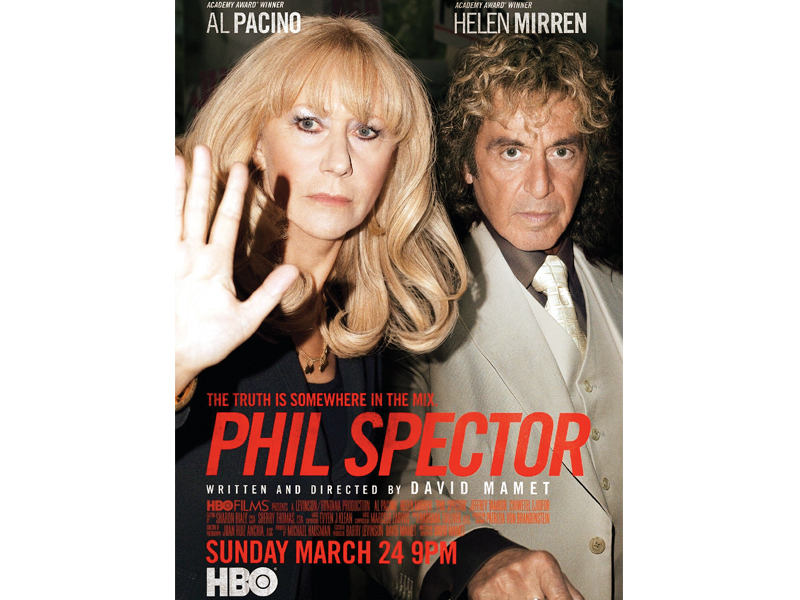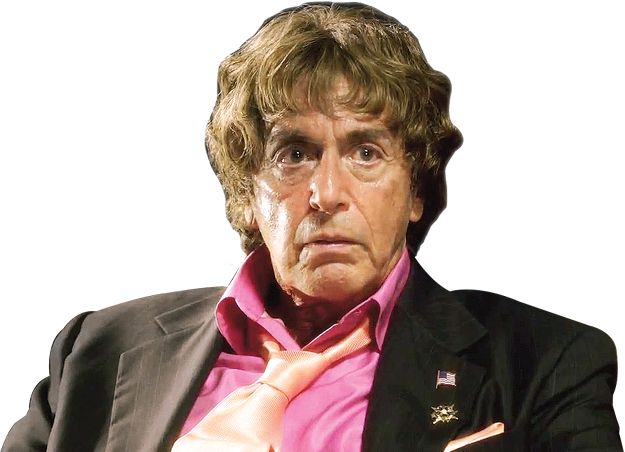
In the court of public opinion, the celebrity is inevitably charged as guilty before trial. Nothing about celebrities is small — their fame or their ignominy.
Director and dramatist David Mamet circles this phenomenon with the real-life 2003 story of Phil Spector, a Hollywood record producer, famed as much for his instinct for millions-making music as for his coifs.
Spector was accused of murdering a young blonde date, actress Lana Clarkson, in his mansion by shooting her in the mouth after picking her up at a nightclub. In the 92-minute television movie for HBO, he is played by Al Pacino, whose Shylock perhaps prepared him for this gruff, flamboyant Jewish businessman’s role. But the real acting comes from his lawyer, Linda Kenney Baden, played by Helen Mirren, who puts in a solid performance as the matronly, pneumonia-ridden legal eagle who is tasked with the impossible job of trying to introduce reasonable doubt.

Mamet was clever enough to keep this story out of the courtroom. We never actually see the trial. Instead, the film is about the pre-trial prep. How does Linda find a way to defend a celebrity who is known to have a history of waving guns about in the studio? He has an ex-wife who claims the fame went to his head and he was abusive towards women. The evidence seems to be damning. But is it? Linda, who originally just appears to assist for a few days on trial, ends up taking the case. She says she thinks he is not guilty. But even she isn’t always so sure.
The first problem is one of blood splatter. If Spector held a gun in Lana’s mouth and pulled the trigger, the front of his body, especially his white coat, would have been sprayed with blood and brain matter. There were no such traces. But Linda knows that the jury’s mind is so made up that they won’t necessarily buy this.
Spector claims that Lana asked to see one of his guns and put it in her mouth. Weapons excite women sometimes, he says. When he saw her put it in her mouth, he shouted “No!” His lawyer wonders if that startled Lana so much that the trigger went off?
According to one line of defense action, Linda would have to prove that Lana was suicidal and killed herself. But attacking the victim doesn’t always go down well with the jury. Obviously, since the action has already happened off screen, the film rides on dramatic delivery between Spector and his lawyer. Al Pacino has been given a great script. There are flashes of logical brilliance as his character is forced to examine and explain why he could or would kill a young woman. For example, Linda grapples with the argument that perhaps he killed Lana because she refused to sleep with him. But then Spector simply points out that this was a moot point because the victim had gotten into his car — of her own free will. The minute she agreed to be picked up and sat in his car, she had agreed to sleep with him.
Lawyers will love this movie but it also holds subtle messages for the rest of us. Mamet is examining how real-world action, perception of what happened, the telling of what happened, and the opinion of what we think happened all form the body of truth formations. A gun may go off and look like murder for all forensic evidence, but sometimes something entirely different could be at work. Mamet’s Phil Spector is a cautionary tale for all those who jump to conclusions — in a way, a very Pakistani audience and media flaw.
Magna opera in curia - courtroom dramas at their best
The Hurricane (1999)

The name Hurricane conjures Bob Dylan who sang about the black boxer Rubin ‘Hurricane’ Carter who was convicted of a triple-homicide and sentenced to three life terms. The movie, starring Denzel Washington, became controversial over its treatment of history. But the film is still high recommended for an education in the trial.
Hannah Arendt (2012)

Arendt was a well known German Jewish philosopher and social theorist who covered the trial of Nazi war criminal Adolf Eichmann in Israel for the New Yorker magazine. Her subsequent book, Banality of Evil, created a storm. In this film, German director Margarethe von Trotta takes on the story of the trial. and the controversies of Arendt covering it.
To Kill a Mockingbird (1962)

This Pulitzer Prize-winning Harper Lee classic, widely read by students in Pakistan, won three Oscars five decades ago. Gregory Peck plays Atticus Finch, a lawyer, who defends a black man of a rape charge during the Depression in the South. Top notch forensic investigation can’t beat the guilty verdict though.
Published in The Express Tribune, Sunday Magazine, August 18th, 2013.
Like Express Tribune Magazine on Facebook, follow @ETribuneMag on Twitter to stay informed and join the conversation.



































































COMMENTS
Comments are moderated and generally will be posted if they are on-topic and not abusive.
For more information, please see our Comments FAQ